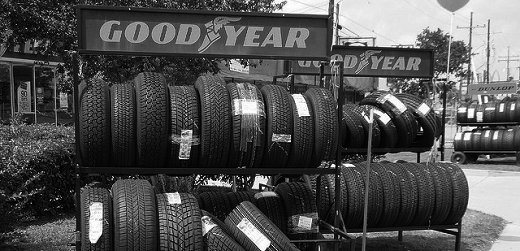
Delayed Federal Investigation of Possible Goodyear Defect Illustrates Another Peril of Court Secrecy
image by Neuble via Flickr
By Jennifer Bennett
Staff Attorney
As we’ve talked about before on this blog, what you don’t know can hurt you. Take Harvey Weinstein, for example, who was allegedly sexually harassing—and then blackballing—women in Hollywood for at least twenty years before anyone found out. Or Remington, which has known for decades that its most popular rifle has a defective trigger that could go off without ever being pulled, but, to this day, refuses to admit it. Or General Motors, which, for years, knew about a dangerous defect in millions of its cars that caused the cars’ airbags to fail in a crash. But, for years, did nothing—even as people were dying because of it.
How did General Motors get away with keeping such a big secret for so long? Just like Weinstein and Remington did: by quietly settling claims and insisting that those settlements be kept secret. Like Remington, GM also enlisted the help of the courts. When the company was sued, it got judges to order that court documents and settlement agreements be sealed from public view. So nobody knew the cars they were driving might be deadly—and people kept dying driving them.
After GM finally recalled the defective cars, there was a lot of ink spilled about the dangers of court secrecy. And yet, it seems, not much has changed. Take a case we’re involved in against Goodyear: For years, Goodyear has faced lawsuits after people were injured or killed in motorhomes that used the company’s G159 tire. The tire, the lawsuits allege, fails at highway speeds—which is problematic for a vehicle designed for road trips. According to one lawsuit, nearly one hundred people have been injured or killed in motorhome accidents allegedly caused by the tire. And yet it remains on the road. Like GM, Goodyear has enlisted the courts in keeping its secrets. Courts in these cases have sealed court records; permitted secret settlement agreements; and issued broad protective orders, allowing Goodyear to shield discovery documents from public view, simply by marking them confidential.
In fact, in one case, Haeger v. Goodyear, the plaintiffs alleged that Goodyear conspired with its attorneys to hide critical test data revealing that the tire was unsafe—and that courts’ willingness to enter broad secrecy orders helped the company pull it off. (This isn’t just wild-eyed speculation: A federal court actually found that Goodyear and its lawyers made “repeated, deliberate decisions” to “make misleading and false in-court statements, and conceal relevant documents.”) The plaintiffs in Haeger gathered thousands of pages of documents that they argue demonstrate not only that the G159 tire has a deadly defect, but that Goodyear knew about the defect and committed fraud to cover it up. Of course, all this evidence is itself subject to court orders mandating secrecy. Public Justice, representing the Center for Auto Safety, has intervened in the case and asked the court to rescind those orders. We’re still waiting for a decision.
In the meantime, yesterday, the National Highway Traffic Safety Administration finally opened a defect investigation into the G159 tire. Why did it wait so long? The protective orders and secret settlements entered in the lawsuits against Goodyear, the agency said, prevented it from getting the data it needed. Secrecy orders don’t just prevent the public disclosure of documents; they often prevent disclosure to the government agencies that are supposed to protect the public. Without information, those agencies are unable to do their job.
It’s not supposed to work this way, and that’s why we at Public Justice think it’s so important to be leading this fight against court secrecy. It’s long been established that the public has a right to access court records that can’t be overcome unless there are compelling reasons for secrecy; and that parties to a lawsuit can’t be forced to keep the documents they receive in discovery secret unless there is good cause. A company’s preference that the public not see evidence that might suggest the company knew about a deadly defect and just let people keep dying is not good cause. Courts are supposed to enforce these rules. Maybe after Weinstein and Remington and GM and, now, perhaps, Goodyear, we’ll see them do so more often.

